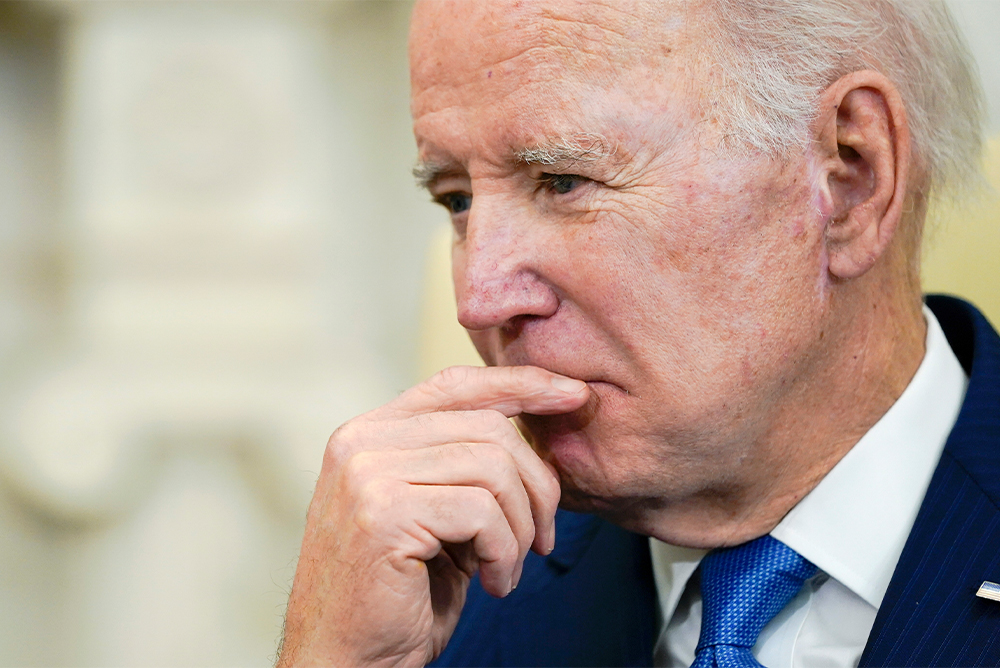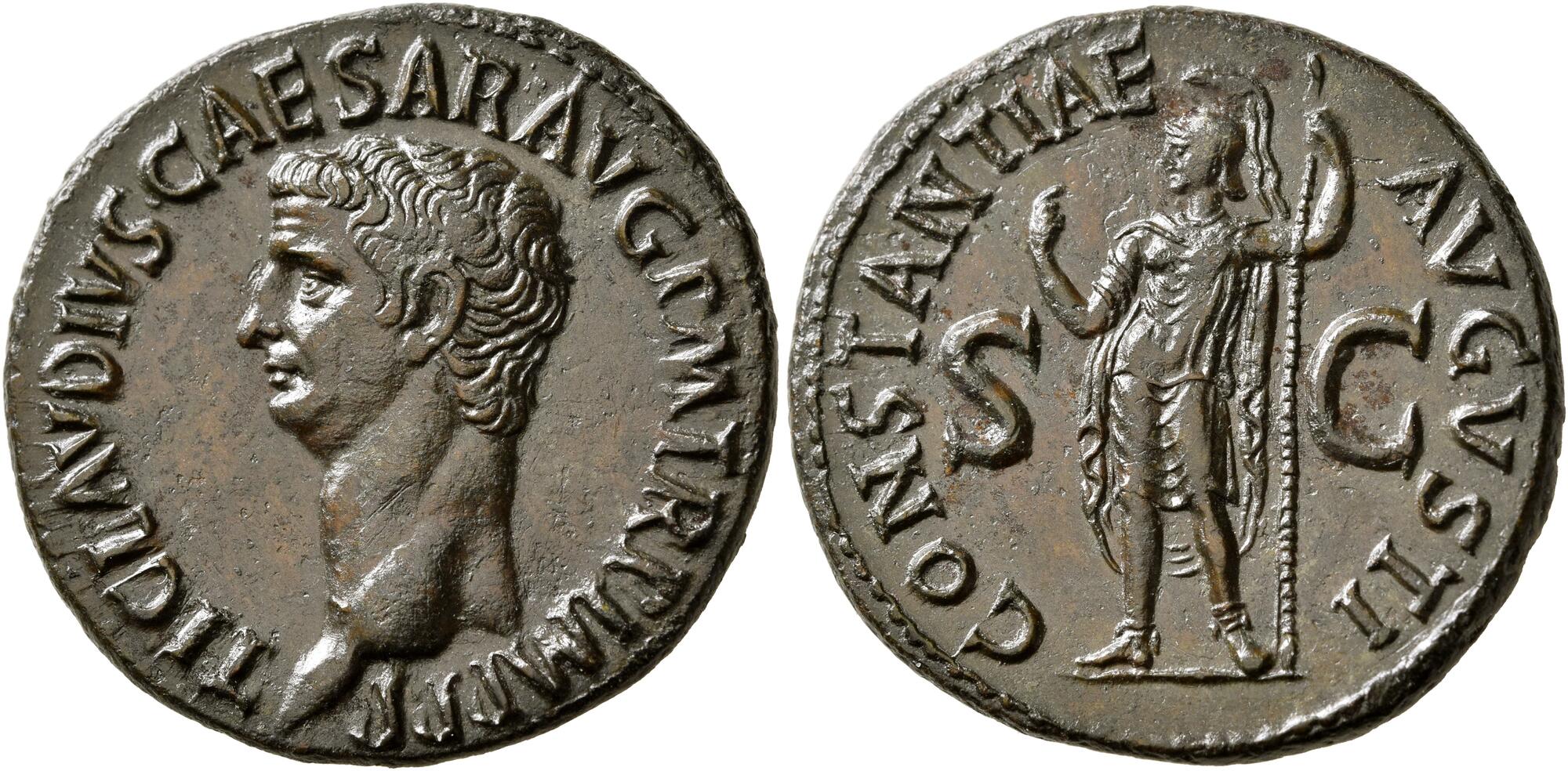
Critics often mention President Joe Biden’s age as a weakness. Historian Michele Renee Salzman reminds that wisdom and experience do not rely on “superficial observations of physicality and virility.” Biden photo courtesy of AP Newsroom.
Those who criticize President Biden as “too old” or “slow” or “confused” might learn something from the very similar treatment of the Roman emperor Claudius.
Claudius, who ruled from 41 to 54 CE, was the most effective and successful member of the Julio-Claudian dynasty, apart from Augustus. He was also the only emperor mocked as weak-willed and feeble. Claudius grew up a sickly, unattractive child with a limp and a speech impediment. His own family teased and derided him, in his early years and beyond. Like other Romans, they saw his physical imperfections as weakness, and cause for disdain. They kept him out of the public eye, encouraged him to study history, and did not allow him to hold any civic or military office.
Caligula, Claudius’ nephew, attained the imperial throne at age 24. In order to stress his Julio-Claudian family ties, Caligula appointed Claudius to an honorific post as co-consul in 37 CE. Yet Caligula followed the family’s view of Claudius as weak, and did everything he could to ridicule his aging uncle. Caligula made Claudius the butt of jokes at dinner. He even required him to pay 8 million sesterces to serve as a priest in the imperial cult, forcing him to sell off property to pay the exorbitant fee.refused to appoint his uncle to any public office of note.
Claudius survived Caligula’s acts of degradation by feigning indifference. When Caligula pushed Claudius into a river, robes and all, out of anger that the older man took part in a senatorial delegation in Germany, Claudius played dumb to avoid provoking further retaliation. Nor did Claudius complain when Caligula humiliated him by making him the last consul consulted on all opinions in the senate. Again, he pretended not to notice the slight.
Claudius had no part in the brutal assassination of Caligula, a mere four years into the young emperor’s reign, at the hands of a praetorian guard infuriated by his cruelty and erratic behavior. In the midst of this palace coup, Claudius, the last of the Julio-Claudian family, feared for his life. He ran and hid in a bedroom in the palace. When a praetorian guard found him and proclaimed him emperor, Claudius quickly promised 15,000 sesterces to each man to win his loyalty.
Thus Claudius lived to take up the throne, at age 50. His policies provided the Romans with much-needed military and administrative reforms. He famously expanded citizenship to provincials, and sought out talented outsiders who could serve Roman institutions. In Lyon in Gaul, modern France, for example, Claudius advanced provincial elites to become members in the senate in Rome. Locals in Lyon appreciated Claudius’ actions on their behalf, and immortalized a speech he offered in their defense by casting it in a bronze which survives to this day. Claudius’ efforts to open the senate to new members set a pattern for greater inclusion that would invigorate the body for centuries to come.
Claudius is celebrated today for his infrastructure reform and building projects; he funded a new port for the city of Rome in Ostia, at the mouth of the Tiber River. He planted new cities and colonies, such as the settlement that is now known as Cologne, Germany. Claudius also supported the successful expansion of Roman rule into Britain, and personally went to Gaul to claim victory there.

Roman coin depicting Emperor Claudius (left). Courtesy of Wikimedia Commons. Public domain.
Despite his many successes, he faced heavy criticism. Roman elites fumed because Claudius expanded the imperial bureaucracy to include freedmen—former slaves who had earned freedom, but not equality, in Roman society. The decision, like Claudius’ support of provincial citizens, demonstrated a canny awareness of the value of incorporating new and talented men into the state. But entrenched elites, who worried about enabling powerful decision-makers from outside the upper class who owed loyalty only to the emperor, ridiculed the new functionaries as lacking in culture, and as being motivated only by economic gain. The biographer Suetonius, for instance, disparaged Claudius for giving out magistracies and punishments in accord with freedmen’s recommendations. Like other Roman elites, he complained that the emperor was too easily swayed by his servants, and did not have the strength of character to make up his own mind.
Looking back on these accusations today, what stands out is the personal mockery that accompanied them—from contemporaries and from later Roman historians—because Claudius did not live up to expectations for physically fit, manly, headstrong emperors. The Romans defined virtue in terms of masculine ideals; the term “virtue” means literally the quality of being a man, requiring physical strength and vigor. Critics usually blamed Roman emperors for military disasters or avarice. They targeted Claudius instead for physical and mental weakness.
Biden’s predicament is similar. Like Claudius, the president can boast many achievements—recovery from the pandemic, building a global coalition in support of Ukraine, creating hundreds of thousands of new jobs, and pushing through historic legislation to rebuild infrastructure and respond to climate change. Yet, like Claudius, he is mocked for lacking the swagger and virility of a younger man.
Members of Biden’s own party openly acknowledge his age, 81, as their primary concern. They worry he will not be up to the physical demands of the presidency, and that he may not finish his term. Ironically, Biden’s likely Republican challenger, Donald Trump, is 77—also elderly. He, too, may not finish out his years in office. Yet Trump’s aggressive bluster and virulent anger, along with his wide girth, make him appear more virile. Voters equate an angry demeanor with a more manly, youthful leader, and do not weigh the advantages of experience and wisdom in a president.
Claudius reminds us that it’s foolish to dismiss a leader’s political skills and wise actions based on superficial observations of physicality and virility. It has taken centuries for historians to reevaluate Claudius’ rule, and to appreciate his administration’s forward-looking policies. Hopefully American voters will be quicker to realize that human virtues and moral strength do not require the appearance of youth.




Send A Letter To the Editors